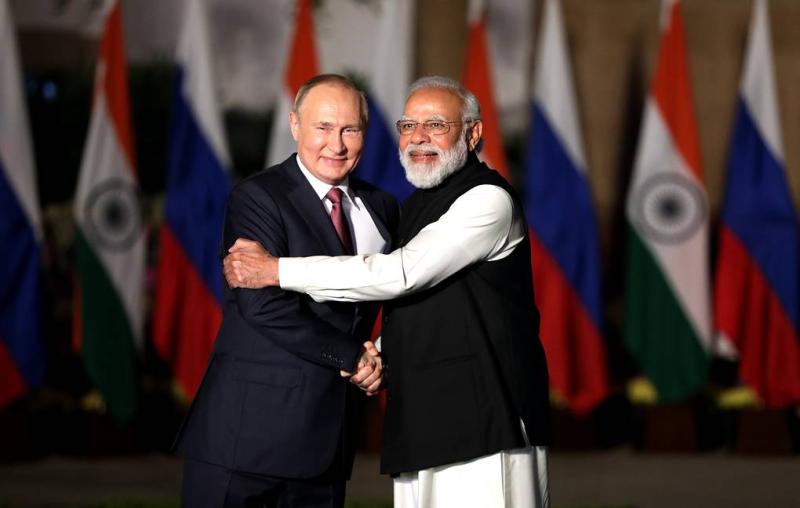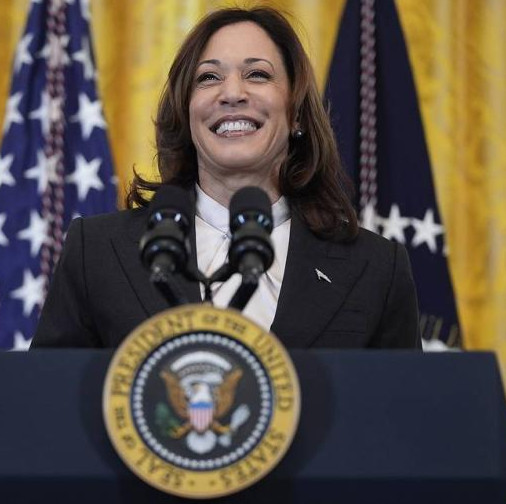
© EPA-EFE/HARISH TYAGI/TASS
Relations with two Asian giants — China and India — have become Russia’s major foreign policy trend in these latter days. The actual military confrontation between Russia and the West in Ukraine and regular border armed confrontation outbreaks between Beijing and New Delhi have only aggravated things around Moscow's Pivot to the South and East strategy. Today, Russia is forced to balance between two heavyweight Asian power centers, not letting their conflict complicate its strategic partnership with any of them.
Notably, Russia's close cooperation with India and China has been around long since. The idea of creating a strategic Russia—India—China triangle (RIC) was first suggested by the then Russian Prime Minister Yevgeny Primakov in 1998 to counter world unipolarity. Present-day interaction between Moscow, New Delhi and Beijing, whose total population is almost 40% of the world's population, and the total GDP has exceeded that of G7, only allows boosting international weight and authority of every single one of them. And judging by their leaders’ statements, their cooperation is not directed against third parties but designed to advance a multipolar world.
It is no secret that each country of the geopolitical triangle pursues both shared and individual interests. Thus, India and China seek greater access to Russia’s oil and gas, while the latter deems it crucial to cooperate in combating international terrorism, drug trafficking and other new threats (especially in Central Asia adjacent to all the three countries over a potential expansion of Islamic extremism in the region).
Moscow, New Delhi and Beijing are, among other things, members of BRICS (Brazil, Russia, India, China and South Africa) and the Shanghai Cooperation Organization (SCO). Here Russia has found itself in a sticky situation and should sustain a sophisticated attitude so as not to affect India or China’s vital interests given their discrepancy. The intrigue in Russia's ties with two strategic partners and irreconcilable opponents zealously following each other's steps, reached a climax in March this year, when Chinese President Xi Jinping arrived in Moscow on a three-day state visit.
This caused serious concern with New Delhi. Most Indian experts concluded that the Chinese leader's visit to Moscow could damage Russia's ties with India, The Times of India wrote. They refer to the two following aspects. First, whether China would become more aggressive towards its neighbors (for which read India — ed. note) with the assurance of Russian support. Second, whether Russia would be guided by China to change its approach towards India and other countries, with whom Russia has close relations currently. Another newspaper, The Indian Express, points out that the Moscow summit has strengthened Vladimir Putin and Xi Jinping’s alliance, which may push India towards greater rapprochement with the West if only to protect its key interests in confronting China.
The Russian-Chinese relations have undoubtedly grown a lot stronger over the past few years, with the parties repeatedly pointing to their "boundless" nature even before the Ukraine conflict began. Suffice it to mention the trade and economic ties that have expanded significantly. Thus, by the end of last year, the two countries’ trade turnover reached $190 billion, as compared to the $30 billion between Russia and India. During the current visit by China’s President to Moscow, the concept of strengthening bilateral cooperation has been further developed. Besides, both leaders have lambasted the US-led Western alliance for creating tensions worldwide, reaffirming readiness to build a multipolar world order.
Still, New Delhi knows how Russia values India’s independent foreign policy, as it has now become a major power capable to strengthen hand in international relations. According to the Indian leadership led by Narendra Modi, "this is not an era of war." Both India and China refrain from anti-Russian resolutions at the UN or disapproving of Western military supplies to Ukraine. This makes official New Delhi think that Russia has no reason to change its current India policy — the one of a "particularly privileged strategic partnership" — because of China’s possible pressure.
With Moscow having no prerequisites to change its friendly attitude towards India — suffice it to mention a multiple increase in Russian energy resources exported to this country, — what if the Indian leadership itself pivots to the West, primarily the United States, which struggles to tear India away from Russia through contradictions between New Delhi and Beijing? Washington's efforts to engage New Delhi within QUAD (USA, Australia, India and Japan), a bloc aimed to counter China in the Indo-Pacific region, are a clear proof of this. Nor should one disregard America’s constant economic and trade overtures with India which is obsessed by temptations of the US market.
But the events of recent date have revealed New Delhi’s ability to withstand pressure coming from Washington. Despite anti-Russian sanctions and Western discontent, India confidently buys huge volumes of oil and grain in Russia, thus demonstrating its independent policy and wish to further cooperate with Moscow. And not only in energy or weaponry.
Don’t forget that relations between major powers are no child's play, and Russia’s strong link to India cannot collapse overnight over its rapprochement with Beijing. All the three states have strategic autonomy, and India should not lose its nerve here. It would be uncharacteristically sophomoric.
RIC may be going through hard times today, but saying that this format is "irrevocably dead" is a little too early — after all, we are dealing with an extra channel for discussing things to exchange views while avoiding direct confrontation. At least, Russia benefits from further RIC performance, since it brings Moscow together with the two largest Asian powers and opens the window for mediation and balancing Russian-Chinese and Russian-Indian relations.
In conclusion, we emphasize that a careful watch must be kept on the RIC triangle as the international situation is changing quickly, sometimes unpredictably. And rest assured the trio should be certainly preserved in the future.









